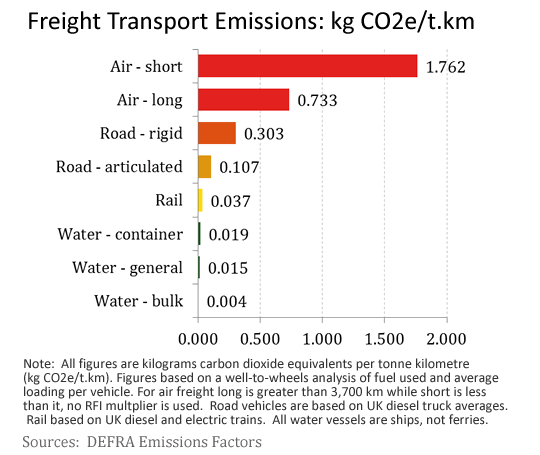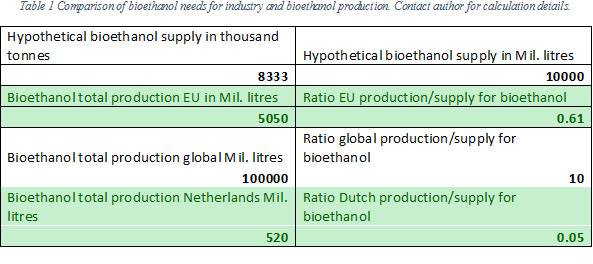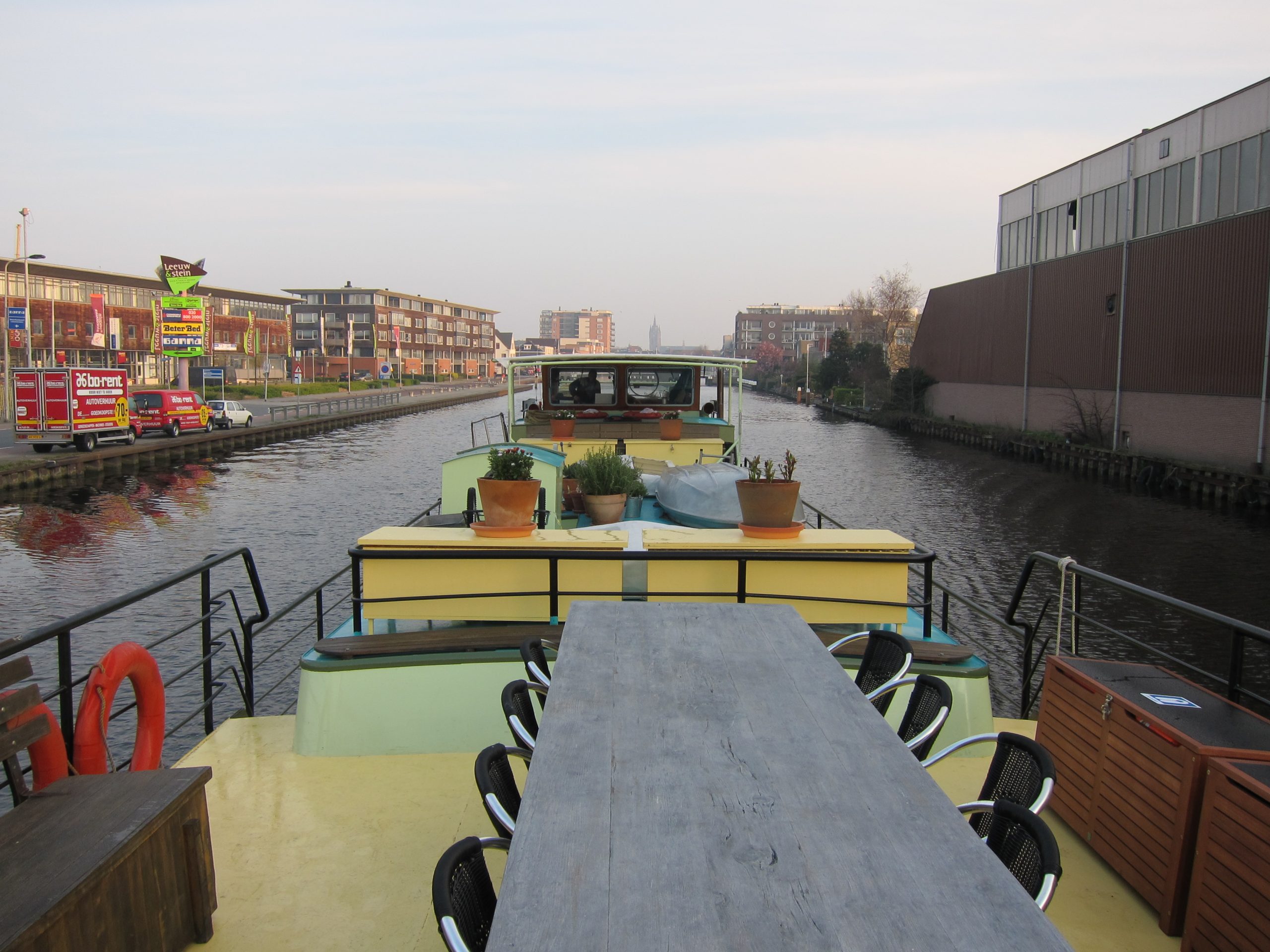On his bike to TU Delft, Roberto Francica, a master’s student in sustainable energy technology, was watching ships passing through the Schie canal. He started wondering what the inland waterway shipping industry is doing to reduce emissions? This is what he found.
(Foto: Art Anderson)
It is a cold, gloomy Monday morning – just like every other day really, 8:35 a.m., and I am, as usual, biking towards the main campus of TU Delft. Having arrived at Delft train station from The Hague just five minutes before, I reach the Hambrug, NOT Hamburg, bridge which is on the way to the Architecture faculty. The bridge spans a canal, of which there are many in the Netherlands.
So it happens that a cargo ship passes by and all the bridges on its way to the final destination are raised harmoniously, one after another. Who knows how many more will be lifted? Who knows what the ship is carrying? All I cared about at that moment was that it was snowing, it was windy, it was cold, and I was about to be late for the lecture. Yet after a while, I realised something.
Everyone has heard about the big push in the car industry to lower emissions. Apparently, Volkswagen wasn’t doing a great job and they got busted – recall Dieselgate. But other companies like Tesla, Chevrolet and BMW are well on their way to developing newer and better electric vehicles propelled by electricity – produced hopefully from renewable energy resources. Some of us might even have heard of the famous Solar Impulse aircraft, a plane powered solely by PV panels. But have we heard about anything like that in shipping, specifically inland waterway shipping? Not really. So let’s explore this topic.
The emission levels of the shipping sector will increase five-fold
I have the pleasure of working in a consultancy company called Panteia, which does, among many other things, research on the decarbonisation of inland waterways and maritime transport. At a certain point in time, I was given the task of investigating the feasibility of using biofuels for powering ships. But before we delve into details, let us look at the importance of the maritime and inland waterway sector.
Across the EU, since 1990 levels, only transportation has witnessed an increase in emissions, while all the other branches of the economy, such as industrial, commercial and residential, have experienced a decrease. The shipping sector in the EU accounts for roughly 4% of greenhouse gas emissions. So why would you care? Because this is the fastest increasing mode of transport, and by 2050 it is expected that its emission levels will increase five-fold, thus the urgency for action. It might be a small problem now, but it will become more significant as time passes.


So the question is, if we want to decarbonise the sector, how do we go about doing that? Well, let’s see. Transporting goods by sea/river is the most efficient means of transport in terms of energy usage, but its large amounts of freight results in high energy consumption per shipment. Our choices are thus limited. Unlike the Solar Impulse aircraft, an average cargo ship cannot be powered by solar panels or wind turbines installed on its deck. Furthermore, the batteries do not have enough capacity to propel a vessel from, say, Basel, Switzerland to Rotterdam in the Netherlands for four consecutive days, not to mention a large cargo ship travelling from Shanghai to Rotterdam for 36 days without calling port. Should we utilise hydrogen? Well not really – the infrastructure is not there yet, the costs are enormous, and pilot projects are few. So what are our options?
Biofuels present an attractive opportunity. They are already widely used in the automotive sector – especially in Brazil in the form of bioethanol. Bioethanol, when used in higher blends, tends to reduce emissions – although not eliminate them. The problem, however, is the supply of these fuels. Ten billion litres of biofuels annually would be needed to fulfil the needs of just the Dutch inland waterway sector. But, in the biofuel world, just how much is 10 billion litres? It represents approximately 20 times the domestic Dutch bioethanol production, almost twice the entire EU production and one-tenth of the whole world’s yield. Taking into consideration that biofuel crops compete with food’s for land cultivation, it would be unethical and unfeasible to use it for powering ships.


What should we do then? Unfortunately, for the near future, it seems like the shipping sector will be the most difficult to decarbonise due to the limitations posed by its enormous on-board energy usage. Using small-blend biofuels, up to 5/10 %, seems feasible, but it would only constitute a small step towards the sustainability that we all envision. While experiments with LNG powered ships are ongoing, using natural gas in any form will not allow the industry to break away from fossil-fuel dependency. And so we have exhausted all the technologies, with no easy-fixes in sight! Perhaps we should be patient while waiting for a revolution to occur, just as we are patiently waiting for the Hambrug bridge to drop …
- PS. Not everyone is that patient! My fellow university students Jaap Boon, Anna Roseboom and Maurits van Helsdingen are part of a project aiming at facilitating the introduction of biofuels in the shipping industry. Their article on this topic will be published on this website on Tuesday January 23th.


Roberto Francica obtained a bachelor’s degree in Electronic and Electrical Engineering at University College London and is now continuing his master studies at TU Delft in Sustainable Energy Technology. His interests lie in green transportation and solar technologies. He currently works as an associate consultant at a Dutch company, Panteia, working on decarbonisation projects.
Bibliography
Equi, Carlos. 2017. LinkedIn. 20 08. Accessed 01 18, 2018.
Delta Lab / Delta Lab offers you the opportunity to share anything you really care about with the entire University community. E-mail us at delta@tudelft.nl.



Comments are closed.